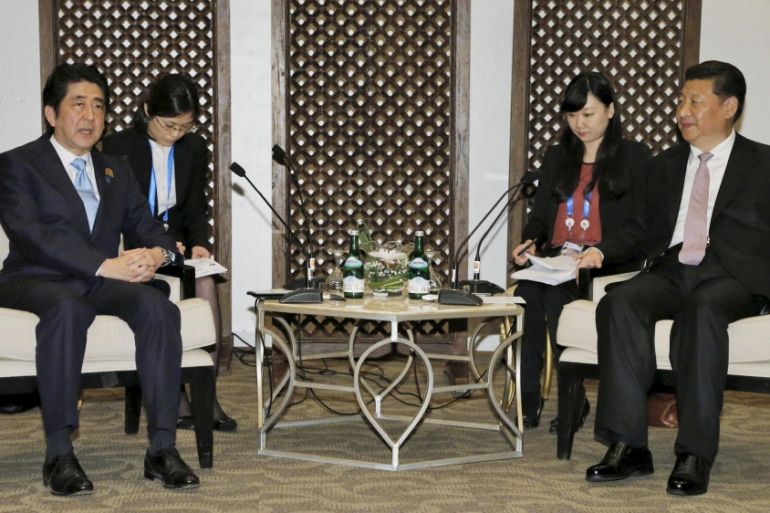Thaw in ties as Japan and China leaders meet in Jakarta
Japan’s PM urges Chinese president to work with him to ease tensions over territorial disputes, at Asian-African summit.

Japanese Prime Minister Shinzo Abe has held talks with Chinese President Xi Jinping on the sidelines of a summit in Indonesia, signalling a desire to mend frayed ties and promote a cautious rapprochement between the two nations.
“We want to make the improving trend in the bilateral relations solid,” said Abe, shortly after his speech at the Asian-African summit in which he warned powerful nations against imposing on the weak, an implicit reference to China.
Keep reading
list of 4 itemsBiden and Xi hold first discussions since November, talk Taiwan and tech
‘Obstetric winter’: Why are China’s hospitals shutting delivery wards?
What is Article 23, Hong Kong’s new draconian national security law?
Tensions between Asia’s two biggest economies have flared in recent years due to feuds over wartime history, as well as territorial rows and regional rivalry.
Abe urged Xi at their meeting in Jakarta to work together to ease tensions in the East China Sea, where they have rival claims to tiny Japanese-controlled islets, the Japanese Kyodo news agency reported.
Memories of Japan’s past military aggression run deep in China and Beijing has repeatedly urged Japan to face up to history.
Abe’s stance on Japan’s wartime past is especially sensitive this year, when he plans to issue a statement marking the 70th anniversary of the end of World War Two.
Al Jazeera’s Step Vaessen, reporting from Jakarta, said: “China has already said that Japan should take full responsibility for what they did during the World War Two.”
‘Deep remorse’
Abe told Xi that he would uphold past apologies, including a 1995 landmark statement by then-premier Tomiichi Murayama, Kyodo reported.
But Abe has also said he wanted to issue forward-looking remarks in his own words, sparking concern he wants to water down past apologies.
On Wednesday, Abe expressed “deep remorse over the past war,” but did not issue a fresh apology.
Xi had spoken at the conference earlier but did not make any reference to relations with Japan.
In Beijing, China’s foreign ministry protested against the visit to the Yasukuni shrine by Japanese legislators.
“In this sensitive year, Japanese politicians should adhere to correct historical views and do more to promote
reconciliation and mutual trust with Asian neighbours, and not the opposite,” said Hong Lei, a foreign ministry spokesman.
Abe’s speech in Jakarta will be followed by a speech to the US Congress next week and a statement in August marking the anniversary of the end of World War Two.